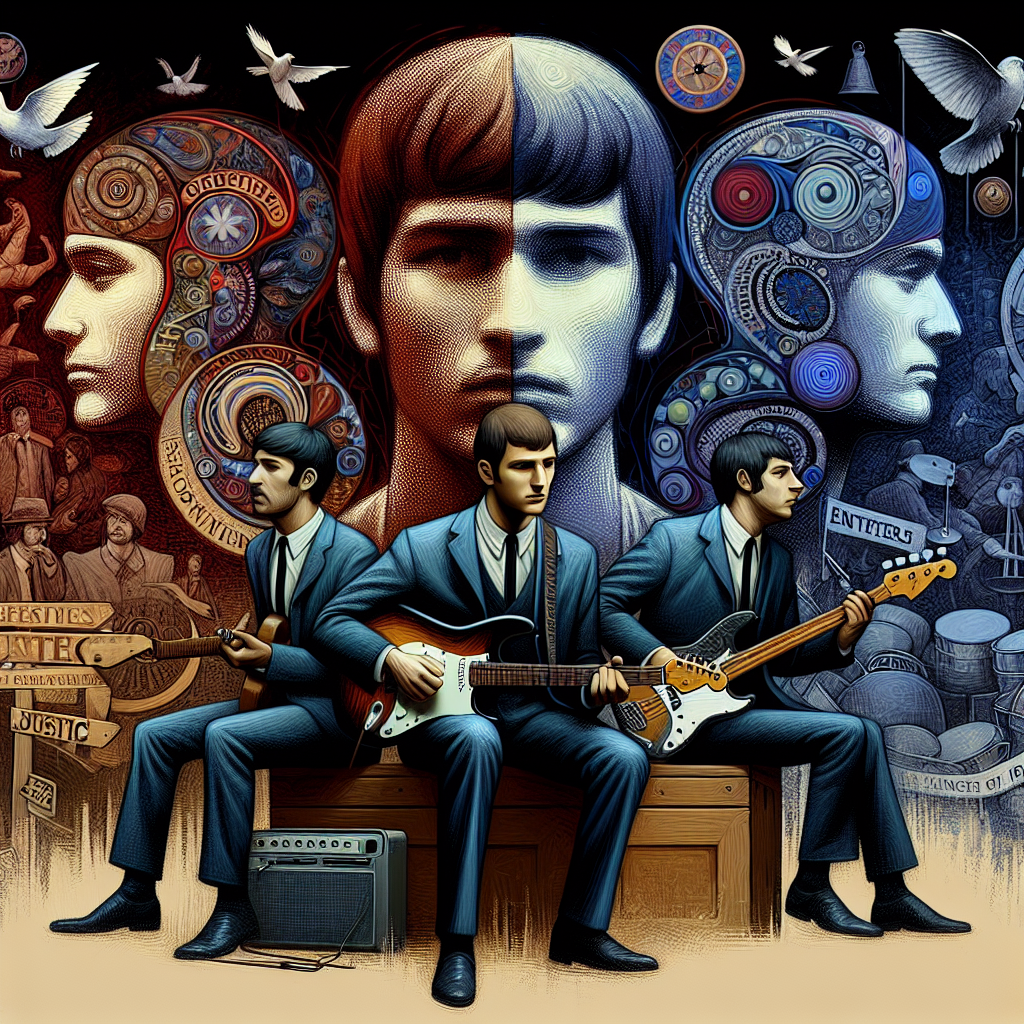Imagine this – a group of four young men from Liverpool taking the world by storm with their catchy tunes and undeniable charm. The Beatles, a band that needs no introduction, captured the hearts of millions in the 1960s and their music continues to resonate even today. But amidst all the fame and adoration, one question lingers: which Beatle went to jail? Join us as we unravel the intriguing story behind this unforeseen twist in the Beatles’ legacy, shedding light on a lesser-known chapter of their remarkable journey.
The Beatles’ Legal Troubles
Introduction to the Beatles’ legal issues
The Beatles, one of the most iconic bands in music history, faced their fair share of legal troubles throughout their careers. These legal battles not only had a significant impact on their personal lives but also on their music and overall legacy. Understanding the legal context of the time is crucial in comprehending the complexity and importance of the Beatles’ legal challenges.
Overview of the criminal and civil cases involving the Beatles
The Beatles faced both criminal and civil cases during their time together. Criminal cases involved arrests and charges for drug possession, while civil cases revolved around disputes over song ownership, copyright infringement, financial issues, and even tax evasion. From drug-related incidents to contentious fights over their music, the Beatles found themselves entangled in a wide range of legal battles.
Importance of understanding the legal context of the time
To fully grasp the significance of the Beatles’ legal troubles, it is essential to consider the legal environment of the era. The 1960s and 1970s witnessed a cultural revolution, marked by social and political changes. The Beatles were at the forefront of this movement, using their platform to advocate for peace and social justice. However, their activism and countercultural image often exposed them to legal repercussions and heightened public scrutiny.
Legal Issues Faced by Each Beatles Member
John Lennon’s Legal Troubles
John Lennon, known for his outspoken nature and activism, faced several legal issues throughout his life. One notable incident involved his arrest for drug possession. Lennon and his wife, Yoko Ono, were fortunate to avoid a more severe punishment due to legal technicalities. Additionally, Lennon’s political activism in the United States led to a highly controversial deportation case, which further magnified his legal troubles and strained his relationship with the U.S. government.
Paul McCartney’s Encounters with the Law
Paul McCartney, widely regarded as the creative force behind many of the Beatles’ hits, also had his fair share of legal encounters. He, too, faced an arrest for drug possession during the band’s heyday. Post-breakup, McCartney found himself entangled in legal disputes over financial issues and the Beatles’ dissolution. These legal battles took a toll on his relationships with his fellow band members and added significant stress to his life.
George Harrison’s Legal Battles
George Harrison, the quiet and introspective Beatle, also found himself embroiled in legal battles. He faced a plagiarism lawsuit regarding the song “My Sweet Lord.” The court ruled that Harrison had subconsciously copied the melody of the Chiffons’ song “He’s So Fine,” resulting in a legal judgment against him. Harrison also had disputes over song ownership, where he challenged the rights to some of his own compositions. Additionally, he faced legal troubles related to tax evasion, putting further strain on his personal and financial life.
Ringo Starr’s Involvement in Legal Disputes
Ringo Starr, the charismatic drummer of the Beatles, also had his encounters with the law. He, too, faced an arrest for drug possession during the band’s years of rock ‘n’ roll excess. Additionally, Starr’s involvement in various business ventures, such as a film production company, led to legal challenges and disputes. Moreover, he fought legal battles over song rights, reflecting the complexities of navigating the music industry even for a celebrated musician like him.

John Lennon’s Legal Troubles
John Lennon’s arrest for drug possession
In 1968, John Lennon and Yoko Ono were arrested for drug possession. The police raided their residence and found a small amount of cannabis. The arrest put the couple under significant media scrutiny, and Lennon’s iconoclastic image only accentuated the attention surrounding the incident. However, the legal case ended up being dismissed due to procedural mistakes made during the search of their property.
The controversial deportation case
John Lennon’s political activism in the United States led to his involvement in a highly controversial deportation case. After becoming a vocal advocate for peace and actively participating in anti-war protests, Lennon found himself under surveillance by the U.S. government. The Nixon administration sought to deport him, citing alleged drug charges as the reason. However, Lennon fought the case with legal assistance and managed to stay in the country, contributing to a further escalation of tensions between the government and the counterculture movement.
John Lennon’s political activism and its legal consequences
John Lennon’s political activism often had legal consequences. His support for causes such as peace, civil rights, and anti-war movements drew the attention of law enforcement agencies. Despite the harassment and legal battles he faced, Lennon remained steadfast in his beliefs and used his fame to shed light on social and political issues. His activism and the legal battles that ensued left a lasting mark on his personal life and reflected the tumultuous times in which he lived.
Paul McCartney’s Encounters with the Law
Paul McCartney’s arrest for drug possession
Paul McCartney, known for his melodic songwriting and captivating vocals, experienced legal troubles in the form of a drug possession arrest. In 1980, while returning to England from Japan, McCartney was caught with a substantial amount of marijuana in his luggage. The Japanese authorities detained him, and McCartney had to endure a nine-day confinement. The incident not only tarnished his image but also resulted in canceled concerts and significant legal expenses.
Legal disputes over the Beatles’ breakup and financial issues
The Beatles’ breakup in 1970 was far from harmonious, as it led to legal battles over the division of assets and financial matters. Paul McCartney, who filed a lawsuit to dissolve the band’s partnership and regain control over his portion of the Beatles’ catalog, found himself in a prolonged legal battle. The process involved complex negotiations, disputes over royalties, and intense media attention. McCartney’s determination to protect his rights and the band’s legacy contributed to a strained relationship with his former bandmates.
Paul McCartney’s legal battles over copyright infringement
Paul McCartney also faced legal challenges related to copyright infringement. In 1971, he filed a lawsuit against his own record company, claiming that their contractual agreement violated his rights as a songwriter. McCartney sought to regain ownership of his songs, including those written during his time with the Beatles. This legal battle, which lasted for nearly a decade, showcased McCartney’s determination to protect his artistic creations and highlighted the intricacies of the music industry’s legal framework.

George Harrison’s Legal Battles
George Harrison’s plagiarism lawsuit
George Harrison, the Beatles’ lead guitarist and a prolific songwriter, found himself embroiled in a plagiarism lawsuit. In 1971, Harrison released his acclaimed solo hit “My Sweet Lord,” only to be confronted with a lawsuit claiming that the song copied the melody of the Chiffons’ song “He’s So Fine.” The court ruled in favor of the Chiffons’ publisher, stating that Harrison had subconsciously copied the melody. This judgment resulted in a substantial financial loss for Harrison and emphasized the legal complexities surrounding music creation and ownership.
George Harrison’s dispute over song ownership
Another legal battle George Harrison faced revolved around song ownership. Harrison, like his bandmates, sought to protect his rights as a songwriter, challenging the ownership and distribution rights of some of his compositions. The dispute shed light on the intricate legal details regarding songwriting credits and royalties. Harrison’s determination to ensure that his artistic contributions were recognized and respected contributed to the overall understanding of the legal dynamics within the music industry.
George Harrison’s involvement in a tax evasion case
George Harrison’s legal troubles extended beyond music-related matters. In the early 1970s, Harrison, along with other high-profile individuals, was subject to a tax evasion investigation by the British government. It was discovered that he had a significant portion of his wealth hidden in offshore accounts. This revelation led to legal consequences, fines, and a reevaluation of Harrison’s financial practices. The tax evasion case showcased how even celebrities were not exempt from legal repercussions and highlighted the importance of abiding by the law.
Ringo Starr’s Involvement in Legal Disputes
Ringo Starr’s arrest for drug possession
Ringo Starr, the Beatles’ talented drummer, faced a drug possession arrest during the band’s era of excess and experimentation. In 1968, while on holiday in Sardinia, Italian police discovered substances in his possession, leading to his arrest. The incident caused temporary strain within the band and further magnified the public’s fascination with the Beatles’ involvement in drugs. Starr’s legal troubles reminded everyone that fame did not shield the band members from legal consequences.
Legal challenges related to business ventures
Ringo Starr’s post-Beatles career involved various business ventures, some of which resulted in legal challenges. His involvement in a film production company, Apple Films, led to conflicts and disputes over financial matters. The legal battles surrounding the company’s operations showcased the complexities of managing artistic endeavors, particularly in an industry as intricate as filmmaking. Starr’s experiences demonstrated the need for legal understanding and expertise when venturing into business ventures as a musician.
Ringo Starr’s legal battles over song rights
Ringo Starr, like his bandmates, encountered legal battles over song rights and song ownership. As a member of the Beatles, he contributed as a songwriter, and the band’s dissolution raised concerns regarding the ownership of the Beatles’ extensive catalog. Legal disputes regarding songwriting credits, royalties, and control of the band’s recordings ensued. Starr’s involvement in these legal battles emphasized the delicate balance between artistic collaboration and individual recognition, while demonstrating the importance of legal representation when disputes arise.

The Beatles as a Collective Entity
Legal issues faced by the Beatles as a band
As a collective entity, the Beatles confronted a multitude of legal issues throughout their career. From contractual disputes with their record label and management to battles over songwriting credits and royalties, the Beatles were constantly navigating legal waters. The band’s immense success and global recognition made them susceptible to exploitation and legal challenges, highlighting the need for legal expertise in managing their careers and protecting their interests.
Lawsuits against the Beatles’ record label and management
The Beatles’ legal troubles extended beyond internal conflicts, as they often found themselves in legal disputes with their record label and management. The band’s dissatisfaction with their first manager, Brian Epstein, prompted legal actions to terminate their agreement. Subsequently, legal battles erupted with their record label, involving contractual obligations, creative control, and financial matters. These lawsuits showcased the complexities of the music industry’s dynamics and the delicate balance between artistic integrity and commercial success.
The Beatles’ legal battles over songwriting credits
The Beatles were known for their masterful songwriting, often credited jointly to Lennon-McCartney. However, legal battles and disputes emerged regarding the true authorship of certain songs. The intricacies of songwriting credits, the division of royalties, and the accurate attribution of creative contributions became subjects of legal scrutiny. The Beatles’ legal battles over songwriting credits highlighted the need for clarity and fairness in the music industry’s mechanisms of recognizing artistic contributions.
Legal Impact on The Beatles’ Legacy
Effects of legal issues on the Beatles’ career
The Beatles’ legal battles undoubtedly left a significant impact on their career trajectory and their ability to create music freely. The strain caused by legal challenges affected their ability to work together harmoniously, contributed to the band’s eventual breakup, and slowed down their songwriting process. Additionally, legal battles over song ownership and royalties hindered their creative independence. The legal issues the Beatles faced disrupted their artistic journey and shaped the legacy they left behind.
Legacy of the legal battles on their music and popular culture
The legal battles the Beatles experienced significantly influenced their music and popular culture. The strain caused by legal challenges seeped into their lyrics, melodies, and overall sound. Their songs began to reflect their frustration, disillusionment, and introspection. Additionally, the Beatles’ legal battles shed light on the complexities of the music industry, fostering discussions around intellectual property rights, artist empowerment, and the importance of legal representation. Furthermore, these legal struggles forever imprinted the Beatles’ image onto the collective consciousness of popular culture.
Lessons learned from the Beatles’ legal experiences
The Beatles’ legal experiences offer valuable lessons to musicians and artists navigating the complex terrain of the music industry. Firstly, understanding the legal context and seeking legal advice is crucial for protecting one’s rights and interests. Secondly, maintaining open and transparent communication within a band or artistic collective can help prevent internal disputes or legal battles. Finally, the Beatles’ legal journey highlights the need for artists to be vigilant about their creative ownership, contractual agreements, and financial management to ensure a sustainable and fulfilling career.

Infamous Incidents and Misconceptions
Misconception: Paul McCartney’s death hoax and legal ramifications
One of the most infamous incidents surrounding the Beatles is the so-called “Paul McCartney’s death” conspiracy theory. In 1969, rumors started circulating that McCartney had died in a car accident and been replaced by a look-alike. While the theory gained traction, it had no legal ramifications for McCartney or the band. The hoax demonstrated the power of media sensationalism and the extent to which individuals can misinterpret and distort information.
Infamous incidents related to the Beatles’ personal lives
The Beatles’ personal lives were often subjected to intense media scrutiny, uncovering infamous incidents that contributed to their legal troubles. From Lennon’s tumultuous relationship with the media to McCartney’s public divorce and custody battle, the band members faced personal challenges that spilled over into the legal realm. The intense public interest in their personal lives magnified any legal battle they faced and further blurred the lines between private and public existence.
Media sensationalism and its influence on the perception of the Beatles’ legal troubles
Media sensationalism played a significant role in shaping the public’s perception of the Beatles’ legal troubles. Headlines portraying the band members as outlaws or framing their actions in a negative light often overshadowed the legal nuances and complexities of their cases. The sensationalized media coverage contributed to the creation of misconceptions and misconstrued narratives about the Beatles’ legal battles, impacting public opinion and potentially influencing legal outcomes.
Reflections on the Beatles’ Legal Journey
Analysis of the legal challenges faced by the Beatles
The Beatles’ legal journey provides an opportunity for analysis and reflection on the challenges faced by musicians and artists. Their experiences highlight the importance of understanding legal rights, contractual obligations, and copyright laws. Analysis of their cases reveals the disparities in power dynamics within the music industry and the need for fairness and transparency. The Beatles’ legal challenges serve as a cautionary tale and a reminder that even the most celebrated artists may still grapple with legal battles.
Comparisons with other iconic musicians and their legal struggles
While the Beatles faced unique legal challenges, their experiences can be compared to those of other iconic musicians. Artists such as Bob Dylan, Led Zeppelin, and Prince have also confronted legal issues regarding copyright infringement, song ownership, and contractual disputes. Drawing comparisons between these musicians sheds light on common themes and legal dynamics prevalent in the industry, further emphasizing the need for legal awareness and expertise within the music community.
Examining the legal dynamics during the Beatles’ era
The Beatles’ legal battles occurred during a time of significant social and cultural change, impacting the legal dynamics of the era. Artists’ rights, intellectual property, and freedom of expression became central themes in the courtroom, partly due to the Beatles’ activism and countercultural influence. Examining the legal dynamics during their time provides insight into the ways in which the music industry and legal system have evolved, and how these changes have shaped the landscape for artists in subsequent decades.
In conclusion, the Beatles’ legal troubles were diverse, complex, and impactful on their personal lives and careers. Each band member faced their own set of legal challenges, from drug possession charges to disputes over song ownership and copyright infringement. The legal battles they encountered individually and as a collective entity highlighted the intricacies of the music industry, the importance of legal representation, and the need for artists to protect their rights and creative independence. The Beatles’ legal journey serves as a cautionary tale for musicians navigating the complexities of the industry, reminding them to remain vigilant, seek legal advice, and learn from the experiences of those who came before them.



